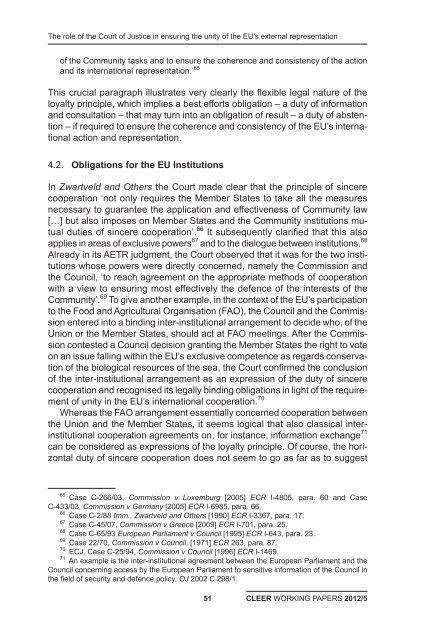Principles and practices of EU external representation - TMC Asser ...
Principles and practices of EU external representation - TMC Asser ...
Principles and practices of EU external representation - TMC Asser ...
Create successful ePaper yourself
Turn your PDF publications into a flip-book with our unique Google optimized e-Paper software.
The role <strong>of</strong> the Court <strong>of</strong> Justice in ensuring the unity <strong>of</strong> the <strong>EU</strong>’s <strong>external</strong> <strong>representation</strong><br />
<strong>of</strong> the Community tasks <strong>and</strong> to ensure the coherence <strong>and</strong> consistency <strong>of</strong> the action<br />
<strong>and</strong> its international <strong>representation</strong>.’ 65<br />
This crucial paragraph illustrates very clearly the flexible legal nature <strong>of</strong> the<br />
loyalty principle, which implies a best efforts obligation – a duty <strong>of</strong> information<br />
<strong>and</strong> consultation – that may turn into an obligation <strong>of</strong> result – a duty <strong>of</strong> abstention<br />
– if required to ensure the coherence <strong>and</strong> consistency <strong>of</strong> the <strong>EU</strong>’s international<br />
action <strong>and</strong> <strong>representation</strong>.<br />
4.2. Obligations for the <strong>EU</strong> Institutions<br />
In Zwartveld <strong>and</strong> Others the Court made clear that the principle <strong>of</strong> sincere<br />
cooperation ‘not only requires the Member States to take all the measures<br />
necessary to guarantee the application <strong>and</strong> effectiveness <strong>of</strong> Community law<br />
[…] but also imposes on Member States <strong>and</strong> the Community institutions mutual<br />
duties <strong>of</strong> sincere cooperation’. 66 It subsequently clarified that this also<br />
applies in areas <strong>of</strong> exclusive powers 67 <strong>and</strong> to the dialogue between institutions. 68<br />
Already in its AETR judgment, the Court observed that it was for the two institutions<br />
whose powers were directly concerned, namely the Commission <strong>and</strong><br />
the Council, ‘to reach agreement on the appropriate methods <strong>of</strong> cooperation<br />
with a view to ensuring most effectively the defence <strong>of</strong> the interests <strong>of</strong> the<br />
Community’. 69 To give another example, in the context <strong>of</strong> the <strong>EU</strong>’s participation<br />
to the Food <strong>and</strong> Agricultural Organisation (FAO), the Council <strong>and</strong> the Commission<br />
entered into a binding inter-institutional arrangement to decide who, <strong>of</strong> the<br />
Union or the Member States, should act at FAO meetings. After the Commission<br />
contested a Council decision granting the Member States the right to vote<br />
on an issue falling within the <strong>EU</strong>’s exclusive competence as regards conservation<br />
<strong>of</strong> the biological resources <strong>of</strong> the sea, the Court confirmed the conclusion<br />
<strong>of</strong> the inter-institutional arrangement as an expression <strong>of</strong> the duty <strong>of</strong> sincere<br />
cooperation <strong>and</strong> recognised its legally binding obligations in light <strong>of</strong> the requirement<br />
<strong>of</strong> unity in the <strong>EU</strong>’s international cooperation. 70<br />
Whereas the FAO arrangement essentially concerned cooperation between<br />
the Union <strong>and</strong> the Member States, it seems logical that also classical interinstitutional<br />
cooperation agreements on, for instance, information exchange 71<br />
can be considered as expressions <strong>of</strong> the loyalty principle. Of course, the horizontal<br />
duty <strong>of</strong> sincere cooperation does not seem to go as far as to suggest<br />
65 Case C-266/03, Commission v Luxemburg [2005] ECR I-4805, para. 60 <strong>and</strong> Case<br />
C-433/03, Commission v Germany [2005] ECR I-6985, para. 66.<br />
66 Case C-2/88 Imm., Zwartveld <strong>and</strong> Others [1990] ECR I-3367, para. 17.<br />
67 Case C-45/07, Commission v Greece [2009] ECR I-701, para. 25.<br />
68 Case C-65/93 European Parliament v Council [1995] ECR I-643, para. 23.<br />
69 Case 22/70, Commission v Council, [1971] ECR 263, para. 87.<br />
70 ECJ, Case C-25/94, Commission v Council [1996] ECR I-1469.<br />
71 An example is the inter-institutional agreement between the European Parliament <strong>and</strong> the<br />
Council concerning access by the European Parliament to sensitive information <strong>of</strong> the Council in<br />
the field <strong>of</strong> security <strong>and</strong> defence policy, OJ 2002 C 298/1.<br />
51<br />
CLEER WORKING PAPERS 2012/5

















